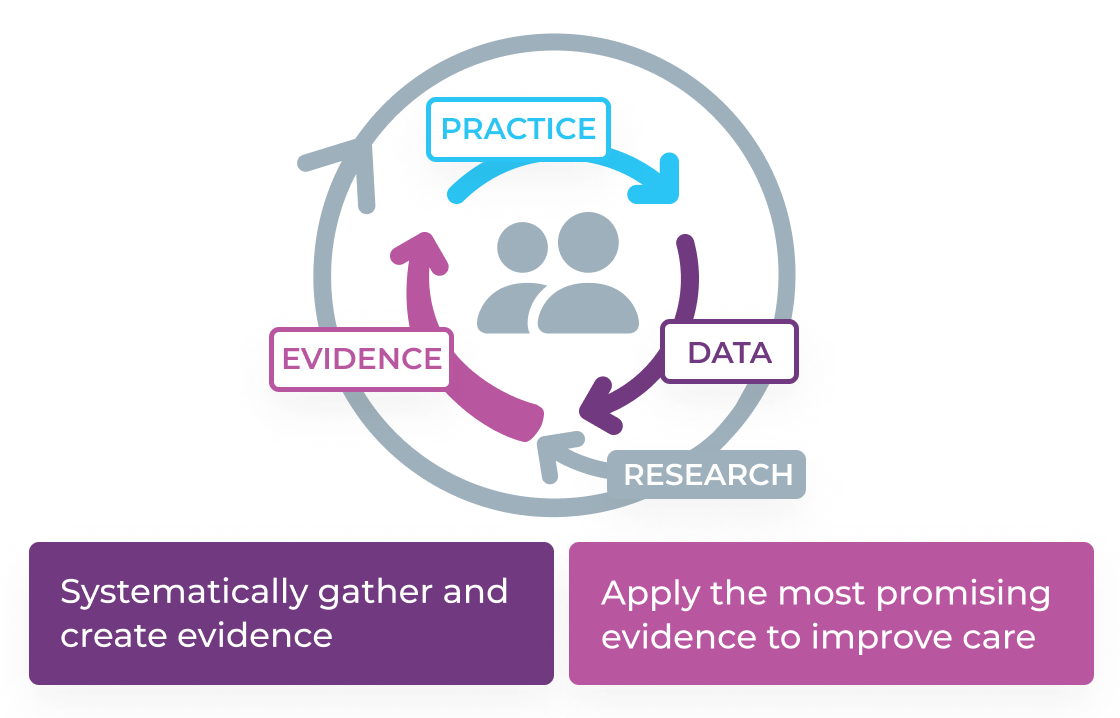Main Menu
Simply put, Learning Health Systems iteratively implement and evaluate health improvement projects. This cycle of continuous improvement results in higher-quality, safer and more efficient care for patients, and better professional satisfaction for healthcare providers.
More specifically, Learning Health Systems are systems in which “science, informatics, incentives, and culture are aligned for continuous improvement and innovation, with best practices seamlessly embedded in the delivery process and new knowledge captured as an integral by product of the delivery experience” (Institute of Medicine, 2015).



Image credit: AHRQ Learning Health Systems
Systematically gather and apply evidence in real time to improve decision-making and guide care.
Continuously assess outcomes and refine processes to create a feedback cycle of learning and improvement.

The Learning Health System team works to build capacity for health system learning and improvement by:
Knowledge Translation (KT) is the process of preparing evidence for use by different audiences. Planning and preparation of KT products based on research findings can happen after a project is complete (end-of-grant KT) or concurrently with stakeholders as research is designed and conducted (integrated KT). Either way, it is important that the format and mode of delivery matches the needs of the end users so that they can use knowledge created through research.
One-on-one consultations to help design your KT plan and prepare your findings in ways that stakeholders can use.

We offer webinars and ‘how-to’ workshops to support you in developing KT skills. Topics include end-of-grant KT, integrated KT, user-centered design, usability testing, evaluation, and engagement. See Training Opportunities for details on these and all AbSPORU training.
We have created a space where people working in health-related knowledge translation in Alberta can access training, funding, and opportunities to connect.
To subscribe to the bi-weekly newsletter sharing knowledge translation related news and events, click here.
For more information on our KT services and training, contact us.

Implementation science (IS) is the study of what works, for whom, when, why and how. This area of science focuses on how to move evidence into policy, process, or practice so that patients have access to high-quality care.
One-on-one consultations to discuss implementation planning, conduct, evaluation, and sustainability planning
We offer webinars and “how to” workshops to support you in developing skills to study and practice implementation. Topics include readiness assessment, identifying appropriate frameworks for implementation practice and evaluation, identification of facilitators and barriers, and sustainability planning.
This certificate program was developed in collaboration with other subject matter experts to create a certificate program aimed to provide foundational skills in implementation science, with a specific focus on the Alberta context. This is a 9 week course delivered entirely online.
For more information on our KT services and training, contact us.
Let us know how you want to stay connected


 News + Events
News + Events

 Patient Partner Research Opportunities
Patient Partner Research Opportunities

 I agree to receive occasional emails from AbSPORU.
I agree to receive occasional emails from AbSPORU.University of Calgary Foothills Campus
3330 Hospital Dr NW
Calgary, AB T2N 4N1
University of Alberta North Campus
Edmonton Clinic Health Academy (ECHA)
11405 87 Ave NW
Edmonton, AB T6G 1C9
The Alberta SPOR SUPPORT Unit operates on and acknowledges the lands that are the traditional and ancestral territory of many peoples, presently subject to Treaties 6, 7, and 8. Namely: the Blackfoot Confederacy – Kainai, Piikani, and Siksika – the Cree, Dene, Saulteaux, Nakota Sioux, Stoney Nakoda, and the Tsuu T’ina Nation and the Métis People of Alberta. This includes the Métis Settlements and the Métis Nation of Alberta. We acknowledge the many First Nations, Métis and Inuit who have lived in and cared for these lands for generations. We make this acknowledgment as a reaffirmation of our shared commitment towards reconciliation, and as part of AbSPORU’s mandate towards fostering health system transformation.
© 2025 AbSPORU